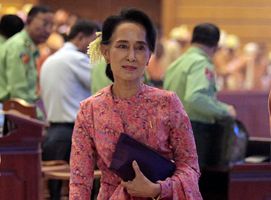![Myanmar Enters a New Political Era [video : 79620960]](http://videos.usatoday.net/Brightcove2/29906170001/2016/01/29906170001_4730899169001_thumb-izzJagO6jyqU.jpg?pubId=29906170001)
YANGON, Myanmar — After more than five decades of isolation and repressive military rule, Myanmar on Monday swore in hundreds of lawmakers in its first freely-elected parliament since the army took power in 1962.
The inaugural session marked the start of a new era for Myanmar (formally known as Burma).
It follows an election on Nov. 8 that saw Nobel Peace Prize laureate Aung San Suu Kyi’s National League for Democracy (NLD) party win two-thirds of available parliamentary seats and effectively rout the country’s military leaders. It comes 26 years after Suu Kyi won a landslide election in 1990 that was later annulled by the nation's ruling military junta.
But there is a long road ahead before full democracy comes to Myanmar.
The military has retained 25% of seats in parliament — giving the generals an effective veto over any changes to the constitution — as well as control of key sectors of the economy and ministries such as defense, interior and border affairs. The army can still take over the government under emergency legislation. Parliament will pick a new president over the next few weeks but Suu Kyi is barred from the post because her children are foreign nationals.
Suu Kyi has said she will serve “above” the president, but it's not clear how much influence she will ultimately have over the country's new leader. Despite its strong electoral mandate, the inexperienced legislature will have to prove that it can effectively govern in an arena previously dominated by army-backed candidates.
“The NLD has spent over a quarter century on the sidelines or in hiding, but ruling Myanmar is going to put it in its most difficult position yet,” said Evan Rees, Southeast Asia analyst for Stratfor, a global intelligence and advisory firm.
“The military is doubling down in parliament right now, choosing seasoned lawmakers and high-ranking officers to lead its bloc. This contrasts with the NLD, which has few experienced lawmakers to choose from. The military's advantage in terms of experience will give it an upper hand in tough negotiations over legislation,” he said.
![Voices: In Burma, hope where once there was only despair [oembed : 79628328] [oembed : 79628328] [oembed : 79628328] [oembed : 79628328] [oembed : 79628328] [oembed : 79628328]](/Portals/_default/Skins/PrestoLegacy/CommonCss/images/smartembed.png)
Outgoing President Thein Sein nevertheless hailed the transition as a “triumph.” He also pledged to cooperate with the government of Suu Kyi, who spent 15 years under house arrest for defying the nation’s military rulers.
“Even though there were difficulties and challenges, we were able to bring a democratic transformation eventually,” he said in a televised address on Friday. “This is a triumph for all Myanmar's people.”
Still, there is no shortage of challenges facing the impoverished Southeast Asian country, which is blighted by corruption after years of neglect by the military rulers and torn by ethnic civil wars and religious strife.
While Suu Kyi has pledged to make peace with armed ethnic groups a priority of her administration, she has been largely silent on the persecution of minority Rohingya Muslims in western Rakhine state. Unrecognized as citizens and subject to discriminatory policies that restrict their access to work, travel, healthcare and education, many Rohingya have fled by boat or are languishing in squalid refugee camps.
Myanmar has an abundance of natural resources but it needs to prove its good governance capabilities to attract foreign investment. The country's gems, jade and other minerals are largely concentrated in ethnic minority regions where armed groups continue to clash with government troops, making peace a critical component of any economic plan.
While direct foreign investment has soared to more than $8 billion last year, many of Myanmar's largest businesses — from jade to oil — are under the direct or indirect control of the military.
Despite the challenges, there was a sense of optimism on the streets of Yangon on Monday.
“I think (Aung San Suu Kyi) will bring good changes to the country,” said May Lay, a 21-year-old university student. “It may take time, but I believe we are heading in the right direction.”
![Myanmar Overview [oembed : 79628398] [oembed : 79628398] [oembed : 79628398] [oembed : 79628398] [oembed : 79628398] [oembed : 79628398]](/Portals/_default/Skins/PrestoLegacy/CommonCss/images/smartembed.png)
Reporting for this article was supported by a grant from the International Reporting Project


![myanmar [image : 79628332]](http://www.gannett-cdn.com/media/2016/02/01/USATODAY/USATODAY/635898944882911381-AX012-6DC1-9.JPG)
